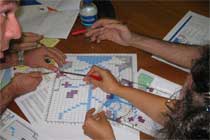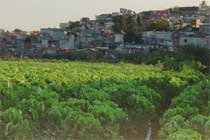|
|

|
Integrated water and land management in peri-urban areas
  Illegal urban development in catchment areas producing drinking water
for the metropolis of Sao Paulo leads to degradation in water quality
in the storage reservoirs due to a lack of sanitation infrastructures.
The involvement of community leaders in the consultation on water and
land management is restricted by vast social inequalities, asymmetry of
information and powers, competition between leaders and the traditionally-paternalistic
attitude of authorities. A ComMod approach was initiated to facilitate
(boost reinforce) the negotiating capacity of local stakeholders and facilitate
their participating in the discussions on the complex questions of water
and land management in near-urban areas.
Illegal urban development in catchment areas producing drinking water
for the metropolis of Sao Paulo leads to degradation in water quality
in the storage reservoirs due to a lack of sanitation infrastructures.
The involvement of community leaders in the consultation on water and
land management is restricted by vast social inequalities, asymmetry of
information and powers, competition between leaders and the traditionally-paternalistic
attitude of authorities. A ComMod approach was initiated to facilitate
(boost reinforce) the negotiating capacity of local stakeholders and facilitate
their participating in the discussions on the complex questions of water
and land management in near-urban areas.
The main phases in the approach were:
-
Themed studies, to improve the understanding of water and land management dynamics in the area;
-
Participative developing and testing of various types of discussion tools (computerised role plays, tool to identify resources mobilised at district level, etc.) with representatives from different types of settlements;
-
Organising a logical activity sequence called Teraguas using several of the tools developed: (i) identifying resources (land, water, urban infrastructure) of the settlements and their dynamics, (ii) identifying stakeholders involved and their action in the resources, (iii) rapid dramatisation (stating a fictitious dispute) used to analyse the modalities for stakeholder interactions, (iii) Ter'Aguas role play gathering local leaders, representatives of the water company and the municipalities, which simulated the collective decision-making processes and illustrated their impact on the region and (iv) collective development of a negotiation strategy by the communities. This process was tested twice: helping to prepare a master plan (Embu Guaçu municipality), and with three communities in the Paralheilos region in dispute with the local authorities and the water company over a sanitation project.
The approach modified representations concerning the stakeholders and the functionning of the system. It improved the understanding of participants on the local water and land dynamics and their management, helped bring local and institutional stakeholders closer together and boosted the ability of local stakeholders to engage in constructive interaction processes.
For further information: two seminar presentations: (Ducrot, 2008; Ducrot and Barban, 2008)
| Last update: January
5, 2010 |
|
|

